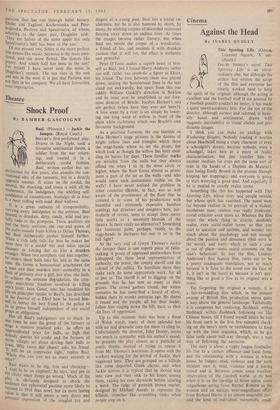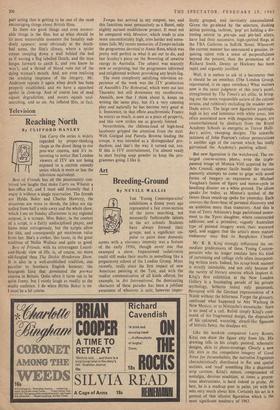Cinema
Against the Head
By ISABEL QUIGLY This Sporting Life. (Odeon, Leicester Square; 'X' cer- tificate.)
DAVID STOREY'S novel This Sporting Life is an extra- ordinary one; but although the author has written the script of the film and everyone has clearly worked hard to keep the spirit of the original; although the acting is excellent and the football stuff (I am assured by a football pundit) couldn't be better, it has made a quite unextraordinary film. For the eye of the director, although earnest and talented, is basic- ally banal and sentimental, drawn with magnetic inevitability to visual cliches and pre- dictable images.
I think you can make an analogy with Wuthering Heights. Nobody reading it worries about Heathcliff being a crazy character or even a schoolgirl's dream, because nobody, even a schoolgirl, takes him as a piece of realist characterisation; but just transfer him to another medium (or even put the same sort of man in the hands of a Daphne du Maurier), thus losing Emily Bronte in the process (though keeping her trappings), and everyone is going to start worrying a good deal. And especially if he is treated in strictly realist terms.
Something like thiS has happened with This Sporting Life, whose story and people remain, but whose spirit has vanished. The novel went far beyond realism in its portrait of a violent, incoherent man; realism was really irrelevant, moral criticism even more so. Whereas the film treats the whole thing in strictly, modishly realist, even social-realist terms, so that you start to question and quibble, and wonder too much about the psychology and not enough about the passion and denseness (that were in the novel), and want—which in such a case is out of place—some moral comment on the man's behaviour. In fact the film, Lindsay Anderson's first feature film, turns out to be a pretty inadequate translation, not so much because it is false to the novel (on the face of it, it isn't in the least) as because it isn't any- thing like as good a film as its original was a novel.
Yet forgetting the original a minute, it is a fair-to-middling film which, in the present swamp of British film production seems quite a way above the general landscape. Technically it is competent but confusing, flashback within flashback within flashback following on like Chinese boxes, till I found myself (since he lost his front teeth in the first few minutes) check- ing on the hero's teeth or toothlessness to keep up with the time sequence, which, as he got false teeth about half-way through, was a rum way of following the narrative.
The story is about a rugby league footballer, his rise to a certain affluence and local fame, and his relationship with a woman in whose house he lodges; mud, violence and the teeth incident start it, mud, violence and a jeering crowd end it. Between comes some excellent observation of the football world, at its best when it is on the tip-edge of bitter satire, some magnificent acting from Rachel Roberts as the woman and an outsize, near-magnificent effort from Richard Harris in an almost unactable part, and the kind of individual, memorable small-
part acting that is getting to be one of the most encouraging things about British films.
So there are good things and even memor- able things in the film, but at what should be its most memorable moments the banality sud- denly appears: most obviously at the death- bed scene, the film's climax, where a spider comes creeping down a wall behind the bed as if waving a flag labelled Death; and the man lunges forward to catch it, and you know he won't; and a thread of blood runs out of the dying woman's mouth. And, not even realising the crashing ineptness of the imagery, Mr. Anderson repeats it again when death has been properly established, and we have a squashed spider in close-up. And of course lots of mud equals degradation, and moors equals soul- searching, and so on. An inflated film, in fact.



































 Previous page
Previous page